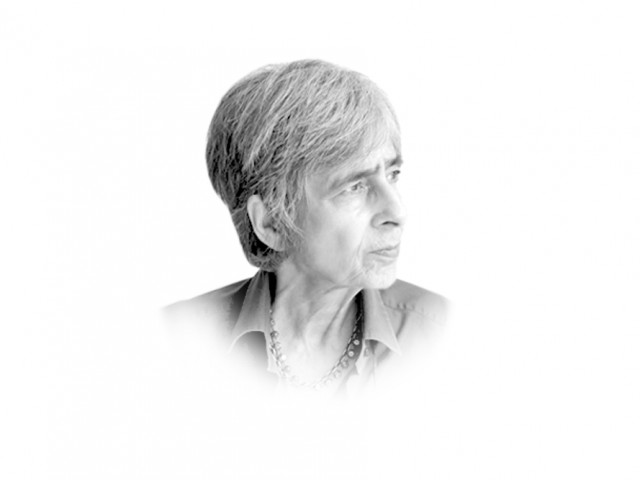Righteous indignation!
We hope that candidates can be honest and ameen, but to expect them to be righteous is akin to asking for the moon.

amina.jilani@tribune.com.pk
To restore the Constitution to its original form, if that is what the Eighteenth Amendment intended, then should not all the previous 17 amendments to the sacred document have been scrapped? Zulfikar Ali Bhutto’s original seven, as has been discussed time and time again, were all drafted in bad faith.
The Parliamentary Committee on Constitutional Reforms (“that came out with a historic document”, according to one press report) held 77 meetings, all of which were attended by its chairman, Senator Raza Rabbani (one member was Raja Pervaiz Ashraf, then a not-so-simple minister, but little could have been expected from him). How is it that Senator Rabbani allowed, in particular, pernicious articles of the Eighth Amendment, and the other amendments, to be retained and why was he economical with the truth when he insisted on telling the people that the Constitution was rendered by the Eighteenth Amendment to what it was in August 1973?
Well, the Eighth Amendment has come round (what goes round comes round) now at election time to bite the hands of those who ignored it, obviously willfully. Articles 62 and 63 are Ziaul Haq concoctions, purely in his regime’s disastrous and rather wicked self-interest.
The Election Commission is fully occupied with a process of “ruthless” scrutiny of those filing nomination forms to become — once again, in many cases — miserable servants of the people, their representatives in the new dispensation. As a front-page headline ruefully told us on April 2, “Poll scrutiny turns into Islamic studies test”. Article 62 lays down the “qualifications” for members of parliament. In its madness, it requires, inter alia, men and women to have adequate knowledge of religious teachings, to practise obligatory duties prescribed by religion, to abstain from major sins (minor being acceptable), to be sagacious, righteous, non-profligate, honest and ameen, and not to have “opposed the ideology of Pakistan” (does anyone know exactly what is this latter, when and where has it been defined and by whom?).
That the much-lauded chief of the Election Commission, otherwise a reasonable man with the normally accepted human failings, has allowed his commission members to quiz candidates on their practice of religion is not readily comprehensible. Do we really need our representatives to be versed in Islamic teachings? And if they must be, then which particular brand of Islam are we looking at? Indeed, we hope (merely hope) that they can be honest and ameen, but to expect them to be righteous (“guiltless, sinless”) is akin to asking for the moon.
Before asking for the undesirable and the irrelevant, Chief Election Commissioner Fakhruddin G Ebrahim, in this context, would do well not to forget that famous paragraph from the Munir Report on the Punjab disturbances of 1953, penned by Justices M Munir and MR Kayani:
“No two Ulema have agreed before us as to the definition of a Muslim given by the Ulema. If we attempt our own definition as such learned divine has done and that definition differs from that given by all the others, we unanimously go out of the fold of Islam. And if we adopt the definition given by any one of the Ulema, we remain Muslims according to the view of that alim, but kafirs according to the definition of everyone else.”
Published in The Express Tribune, April 6th, 2013.













COMMENTS
Comments are moderated and generally will be posted if they are on-topic and not abusive.
For more information, please see our Comments FAQ